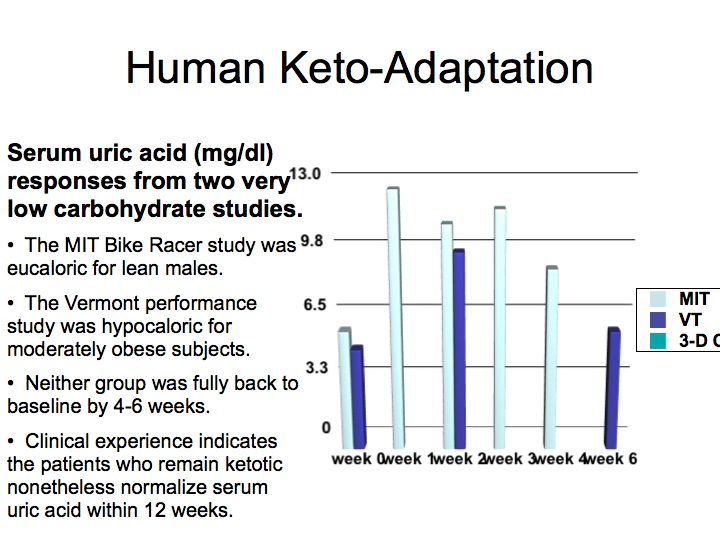Kidney Stones
Replies
-
Just catching up on this thread. @ wabmester, I'm sorry to hear about your kidney stone ordeal! Thanks so much for sharing what you've learned. I will definitely pay closer attention to my hydration and sodium levels.
Hope you feel much, much better soon!0 -
Any excuse to eat salt and be a couch potato sounds good to me. Not that I can run far enough to ever get dehydrated but I often ignore thirst. I should see if the hospital will send me a pic of my bile stones, there was so many they said they'd use the picture for teaching medical students.
How are you feeling now? Are you in agony? And exploded kidney sounds excruciating.
200g of carbs might be a wee bit high for stumpy lumps such as myself but for an active man it sounds good.
I had my gall bladder out when I was 16 after a few years of pain from gall stones that they couldn't figure out because nobody thought a 16 year old would have that problem.
My surgeon said I was his youngest patient ever and would reference my more than 100 stones when teaching. Lol0 -
Loosing weight is a risk because it puts more uric acid in the urine which can also cause painful gout. The faster you loose the greater chance you could get gout. Why not kidney stones also? The last three days I have been trying to pass one. Very painful but not like an extreme case of gout. I had to have surgery on both feet and my elbow at the same time over nine years ago. Drink lots of water and loose 1-2 pounds a week. Best wishes for a speedy recovery.
0 -
Wab, I feel your pain, I got one 20 years ago on a normal diet. One of the most painful things I have ever had, but I didn't have a ruptured Kidney... Ouch!
I thought just about everyone over 40 had them, and it was just a matter of time before they broke off?
It sounds like one of those things like cancer, they don't actually know what goes wrong.
And I know when I went into Bariatric Surgery seminars, they said that rapid weight loss after surgery sometimes would cause stones. They would proactively put you on a med that would prevent stones. But you haven't rapidly lost weight have you? And I can't remember which stones they were, Gall or Kidney?
Oh well, I hope you're feeling better soon,
Dan the Man from Michigan
0 -
Thanks, gang. I lost weight by basically eating at my future maintenance calorie level, so it was SLOW -- about 1 lb per week.
Some stones are uric acid, and yes, they're the same crystals associated with gout. Uric acid levels can rise on a VLC diet, but they seem to normalize over time. There's a great conversation here between Phinney and another scientist where they sort of debate the causes and effects:
http://www.meandmydiabetes.com/2011/05/30/steve-phinney-and-richard-johnson-sugar-ketones-fat-uric-acid-in-health-and-diseaseev/
Here's a chart where you can see uric acid levels rising in the first 4 weeks and then going down:
Interestingly, fructose consumption is associated with uric acid levels and incidence of both gout and kidney stones:
http://www.ncbi.nlm.nih.gov/pubmed/17928824
I haven't looked into gall stones much, but my impression is that they're due to bile crystallizing in the gall bladder. They are associated with weight loss, but might be specific to low-fat diets since it's fat in the meal that triggers the gall bladder to empty.0 -
articles.mercola.com/sites/articles/archive/2009/06/23/who-knew-preventing-kidney-stones-was-this-easy.aspx
This doctor can be a bit boring to watch but I find him to typically be very knowledgeable. He list potential causes and preventions of kidney stones.0 -
I've been going through the kidney stone learning process myself these past ten days, and haven't been on MFP forums that much as a result and didn't note this great thread until now. I'd passed a smaller stone last week but the ER scan showed a larger one lurking; I was in hospital today for lithotripsy (ultrasound break up of larger stones) and while hanging around waiting for xray before the procedure had to take a bio break and, well, the larger stone is history. The timing couldn't have been closer, they were just getting ready to pump me full of happy juice.
Both stones are off for analysis (they look similar). Looking forward to the result.
I'm not doing keto... I'm merely on a lower-carb macro break down (35% is my daily target) and I'm also a runner. I can drop 2kg of water during a 90-120 minute run, and often do. This is pretty common - expected even - among distance runners though. I thought I was staying on top of hydration... but maybe not.
I'm not eating particularly high levels of protein. I do consume quite a bit of yogurt; prior to starting my weight loss program last fall I hardly had any dairy products as they caused me GI distress. Since losing weight that's all changed. I'd read somewhere that low calcium (maybe a vitamin D link there too) can be a contributing factor to one type of stone development.
The pain associated with kidney stones is quite... amazing. Of course I'd heard that before but after experiencing it first hand... man, if that isn't encouragement to making whatever changes are necessary to avoid a repeat I don't know what would work.
That said the fellow sitting beside me has had 15 stones over his life time starting at age 16. Yikes!
0 -
Time for another installment of The Gent with the Stone and the Stent!
I talked with my new buddy, the urologist, yesterday. Surgery is scheduled for Oct 2, but the fun doesn't stop there. I'll get a new post-surgery stent to let my ureter recover from surgery for a week or so. And then I get a metabolic workup from their stone analyst, The Stone Lady.
I peppered the doc with questions, of course. Some interesting factoids for your amusement:
Incidence of stone-induced kidney rupture is pretty rare -- he estimated it at 1%, and my primary care doc had never seen a case.
The detection of the stone via CT scan turned out to be non-trivial. It was located about 1cm from a couple pelvic phleboliths (apparently harmless calcifications). Luckily, I had an earlier CT scan so the radiologist could compare and determine that one of those things didn't belong with the others.
I asked the doc if the CT scan could be useful in determining stone composition. His PA shook her head, but then the doc explained that opacity does correlate with composition. Uric acid stones are less opaque (around 300 HU), and calcium stones were around 900+ HU.
So we measured mine on the scan, and it was around 600 HU. Probably a mixed stone. Not very useful from a prevention standpoint, but still interesting.
I'm hoping that the follow-up with The Stone Lady will provide some additional insights. I'd REALLY like to avoid more of these in the future, and I'll happily pass along any tips.
0 -
Thanks for the update @Wabmester!
Sidenote: in your post of the pictures of the different stone types, did you see in the comments the guy who wants to buy people's stones for his collection? Potential income there, right? Lol!
I hope avoidance is as simple as increasing your fluid intake! Good luck with the surgery!0 -
Researching kidney stones has exhausted me.

My friends and family are convinced that my "crazy diet" was the cause of my stone. They may be right.
Probably the best analysis is from Paul Jaminet:
http://perfecthealthdiet.com/2010/11/dangers-of-zero-carb-diets-iv-kidney-stones/
I'm not going to summarize it, and his conclusions may be wrong. The only thing he got right for sure was this:
A 100-fold odds ratio is hardly ever seen in medicine. There must be some fundamental cause of kidney stones that is dramatically promoted by clinical ketogenic diets.
Just over half of ketogenic diet kidney stones are composed of uric acid and just under half of calcium oxalate mixed with calcium phosphate or uric acid. Among the general public, about 85% of stones are calcium oxalate mixes and about 10% are uric acid. So, roughly speaking, uric acid kidney stones are 500-fold more frequent on the ketogenic diet and calcium oxalate stones are 50-fold more frequent.
So the biggest increase in risk is for uric acid stones, probably due to the increased uric acid load and acidic urine from protein metabolism on some ketogenic diets.
In my case, my urine was alkaline, and I wasn't on a hard-core ketogenic diet. I think the content of my diet was a minor factor.
I think it was fluid levels. I ran 5 days a week. I would lose 2lbs of water via sweat during a run.
But my urine was never dark, and I drank a lot of water, so WTH?
Ready for my theory? This could be wrong, of course. We all lose water weight on a low-carb diet. Sure, part of it is due to glycogen stores being burned out, but most of it is due to sodium loss.
Why do we lose sodium? Because we have ketones in our urine, and the ketone anions get covered by sodium cations. Sodium blood concentration is TIGHTLY regulated, so our body has to dump water to maintain blood sodium concentration.
We end up with less sodium, less blood volume (water), and higher CONCENTRATIONS of other solutes in the urine.
Like I said, I could be wrong, but I think the water weight we lose is possibly a kidney stone risk.
FWIW, the sources they cite regarding those figures appear to be quite old. The first one is a paper from 2000, which referred to studies done in the 90s. This matters for the keto-for-epilepsy studies, because previous versions of the ketogenic diet were calorie and fluid restricted, thereby creating compounding reasons for the increased incidence of kidney stones that may not have been related to the macronutrient ratio.0 -
True, hydration is obviously a key factor, but those studies are still interesting since they show such a large increase in incidence. There are also studies that show correlation with dehydration (including climate and job-related factors), but AFAIK, nothing compares with the increased risk shown in those keto kids.0
-
I thought too much protein was a possible cause of kidney stones? Not sure if that was mentioned0
-
-
I'm halfway done with this adventure. I had my last meeting with my new best friend, the urologist. He went in early Friday morning to remove the stent. He also went in with a laser-equipped camera to zap the stone, but he found no stone!
That was a little disconcerting, but luckily (!?) I peed out sand a few hours later, so he apparently crushed the stone while he was fishing around inside of me.
The good news is that my kidney has healed from the back-pressure induced explosion.
The bad news is that I have a new stent to let things heal from this latest surgery. It should be removed next week, and then I can FINALLY get back to exercise.
At some point in the future, they may analyse the stone fragments I collected yesterday, and then they may do a 24-hour urine collection to determine how I might be forming these rocks. I'm really looking forward to that!
Since surgery was scheduled for early Friday morning, we left our small town and splurged on a hotel in the big city. Pretty fancy place. It even came with a dog bed and dog dishes.

1 -
Glad to hear things came out OK! What a relief it will be to have it all behind you.0
-
Glad one stent to go and you'll be done with your medical adventure! So happy things have gone well overall. Hope they can analyze the "sand" for you too! Good luck with removal of that last stent and getting back to your exercise routine!0
-
Thanks for the well wishes! My biggest fear is that they'll figure out that the cause is all of the oxalate-rich stuff I eat like nuts, chocolate, and berries. I live on that stuff!
The guy in the next room was waiting for his surgery. They ask you to describe the procedure you're about to undergo just as a CYA. He answered "you're going to install high-speed internet cable." And the doc answered "correct, and we'll do it sometime between noon and 5pm." 1
1 -
Lol!0
-
Thanks for the well wishes! My biggest fear is that they'll figure out that the cause is all of the oxalate-rich stuff I eat like nuts, chocolate, and berries. I live on that stuff!
I would go crazy without those things, too!The guy in the next room was waiting for his surgery. They ask you to describe the procedure you're about to undergo just as a CYA. He answered "you're going to install high-speed internet cable." And the doc answered "correct, and we'll do it sometime between noon and 5pm."
Too funny!
Best wishes for getting through the rest of this journey as painlessly as possible, Wab! Thanks for sharing your experience. I have to admit I'm a little nervous about the possibility of kidney stones on this WOE.
0 -
Thanks for the well-wishes and entertainment.

I think ACV is probably as good as lemon juice. Evidence seems to point to citric acid binding to Ca as the factor more than effects on urine pH.
A natural health practitioner I went to recommended both of these for a variety of reasons. I had a kidney stone a year ago, at which time I abandoned attempting to eat paleo-style in favor of more meatless meals. Not sure it was that so much as dehydration. The same practitioner also recommended a homeopathic tincture called Stone Breaker, which I think worked because by the time I got a script for pain meds and flomax and had a scan, it had broken up (pain meds thankfully helped with passing the shards).
Ugh. So miserable. I'm sorry, and hope you don't have to experience it again!
0 -
Sorry you had to go through this, @mountainrun73. Were you running at the time? If so, that would make three people on this thread who were running a lot while they were making stones.
I'm still waiting to hear back from the urologist about something he said to my wife after surgery. While he didn't find the stone, he did say that the stent he removed was "encrusted." This is fairly common for stents left in for a longer period -- the stent itself acts as a seed for crystal growth.
So that tells me I was still forming crystals for the last month or so. Why is that interesting?
Because I stopped running. I was drinking a lot of water. And I increased my carb intake to reduce ketone production and to reduce sodium losses so I could retain more water. I was also adding lemon and lime juice to my water to increase citric acid.
So I'm still prone to making stones even without ketosis, without exercise, and without dehydration. It's still a mystery to me, but this suggests that my stone experience was all about me and not about running or ketosis.0 -
@wabmester - I wasn't running at the time, though I was doing gym workouts (cardio and weights) 3-4 times a week, but it was also during the period that I started getting lazy, inconsistent, and giving into junk food addictions more often. So that may have had something to do with my experience.
I've read that Apple cider vinegar can help break down stones. Someone on another thread mentioned it as helpful for digestive issues. My natural health practitioner/advisor reminded me to start drinking a glass of warm water with lemon every morning. I have read that can help with stones, too, but it sounds like it hasn't in your case.
Ugh. Keep us posted!0 -
Does anyone having any actually experience/case studies of using something like Zeolite Pure from Zeo Health to help prevent kidney and gallbladder stones? That is the power form not the liquid types.0
-
Time for an update!
Last week, I had stent #2 removed. I will spare you from the indignities and pain caused by that second stent, but it was a HUGE relief to get that thing out of me, and I started exercising again a couple days after that glorious event.
I submitted some stone fragments for analysis, and I just got the results:
Calcium Oxalate Dihydrate (Weddellite) 20% Calcium Oxalate Monohydrate (Whewellite) 80%
The fact that there was no uric acid in the stone suggests that neither protein intake nor increased protein catabolism were factors. Those are two factors often associated with a ketogenic diet, so it probably had nothing to do with ketosis.
What then? I'll go in for a metabolic work-up in a couple weeks, and that may shed some more light, but I'd guess that one factor was an increased oxalate intake.
To your body, oxalate is simply waste and it has to be excreted (assuming some oxalate-loving bacteria didn't find it first).
The biggest change in my diet was an increase in high-oxalate foods: berries, chocolate, and nuts. And my biggest increase in nut consumption was almonds.
Here's a good table of oxalate-containing foods:
http://www.wakehealth.edu/Urology/Kidney-Stones/Oxalate-Content-of-Foods.htm
I blame the chocolate and the almonds. I love that stuff, but I'm cutting back.
0 -
Sounds like a plan, I hope it works!
Dan the Man from Michigan
Keto / The Recipe Water Fasting / E.A.S.Y. Exercise Program
Current weight: 198.5, 115.5 pounds down, 19.5 to go. 13 months on diet0 -
@wabmester if you are not on a high dosage of Vit K2 (both the 4 and 7 types) you may want to google it. K2 4/7 is what tells Calcium where to go I am reading.
The below is a so so link but you can google forward if it is of interest to you. I have been talking Life Extension's Super K with Advanced K2 Complex for a year now. After one stone a few years ago I do not want a repeat of that experience. We need our calcium in our bones and teeth instead of leaching out of our bones and teeth into our kidneys and brain leading to cancer, heart attack, stroke and worse.
articles.mercola.com/sites/articles/archive/2012/12/16/vitamin-k2.aspx0 -
@GaleHawkins, I haven't really looked at any supplements, but Potassium-Magnesium Citrate has been found to be VERY effective in reducing stone recurrence in stone-formers. 85% reduction!
http://www.ncbi.nlm.nih.gov/pubmed/9366314
A lot of people here already supplement both Mg and K -- the citrate form is especially helpful because it alkalizes the urine.0 -
V made this comment in another thread -- I've moved it here where it belongs.
 Nephrolithiasis/kidney stones...ironically is an adverse drug reaction typical of many meds that cause metabolic acidosis, such as Topiramate, zonisamide, acetazolamide, etc. (not listing meds causing kidney stone that do NOT produce metabolic acidosis). There has got to be a correlation with metabolic acidosis obviously. I would speculate that the kidneys overcompensate for electrolyte losses to provoke kidney stones (I.e.kidneys absorb too much minerals due to how easily electrolytes are excreted while on keto).
Nephrolithiasis/kidney stones...ironically is an adverse drug reaction typical of many meds that cause metabolic acidosis, such as Topiramate, zonisamide, acetazolamide, etc. (not listing meds causing kidney stone that do NOT produce metabolic acidosis). There has got to be a correlation with metabolic acidosis obviously. I would speculate that the kidneys overcompensate for electrolyte losses to provoke kidney stones (I.e.kidneys absorb too much minerals due to how easily electrolytes are excreted while on keto).
I think you're right, but you probably need a lot of ketones over a long period. I think this might explain the high stone occurrence in kids who go on ketogenic diets for control of epileptic seizures. They also experienced calcium loss, presumably due to mild acidosis.
In my case, I was usually mildly ketotic, and I would intentionally increase carb intake periodically to avoid ketosis.0 -
In this instance, Vitamin K/K2 is NOT potassium, as it is on the periodic table. It's a separate thing. I know folks on blood thinners aren't supposed to have Vitamin K, but they are supposed to have potassium (in some cases). Just FYI.0
This discussion has been closed.












